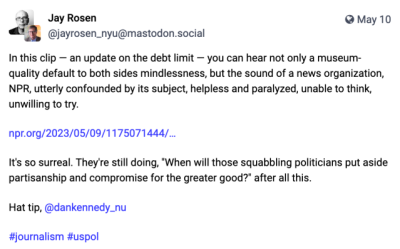 Federal authorities have charged three men in the vandalism and harassment case involving two journalists at New Hampshire Public Radio. In the press release below, issued Friday by the U.S. attorney’s office for Massachusetts, “Victim 1” is NHPR reporter Lauren Chooljian; “Victim 2” is her editor, Dan Barrick; and “Subject 1” is Eric Spofford, the founder New Hampshire’s largest network of addiction treatment centers.
Federal authorities have charged three men in the vandalism and harassment case involving two journalists at New Hampshire Public Radio. In the press release below, issued Friday by the U.S. attorney’s office for Massachusetts, “Victim 1” is NHPR reporter Lauren Chooljian; “Victim 2” is her editor, Dan Barrick; and “Subject 1” is Eric Spofford, the founder New Hampshire’s largest network of addiction treatment centers.
Spofford has denied any involvement in or knowledge of the vandalism. He has filed a libel suit against Chooljian and NHPR, which drew the attention of The New York Times (free link) after a judge ordered that NHPR let him examine the transcripts of interviews so that he can determine if they are relevant to Spofford’s claim. The full press release is as follows:
BOSTON — Three New Hampshire men have been charged in connection with a conspiracy to harass and intimidate two New Hampshire journalists employed by New Hampshire Public Radio (NHPR). The alleged harassment and intimidation of the victims included the vandalism — on five separate occasions — of the victims’ homes, as well as the vandalism of the home of one of the victim’s immediate family members with bricks, large rocks and red spray paint.
Tucker Cockerline, 32, of Salem, N.H., Michael Waselchuck, 35, of Seabrook, N.H. and Keenan Saniatan, 36, of Nashua, N.H. were each charged by criminal complaint with conspiring to commit stalking through interstate travel. Cockerline and Waselchuck were arrested this morning and, following an initial appearance in federal court in Boston this afternoon, were detained pending a hearing scheduled for June 20, 2023 at 2 p.m. Saniatan remains at large.
“The critical role that the press plays in our society goes back to the founding of our nation. Today’s charges should send a clear message that the Department of Justice will not tolerate harassment or intimidation of journalists. If you engage in this type of vicious and vindictive behavior you will be held accountable,” said Acting United States Attorney Joshua S. Levy.
“Freedom of the press is a cornerstone of any healthy democracy and these three men are now accused of infringing on that freedom by conspiring to harass and intimidate two New Hampshire journalists who were simply doing their jobs,” said Christopher DiMenna, Acting Special Agent in Charge of the Federal Bureau of Investigation, Boston Field Division. “Everyone has a right to express their opinion, but taking it over the line and committing vandalism will not be tolerated.”
According to the charging document, after a year-long investigation, an NHPR journalist (Victim 1) published an article in March 2022 detailing allegations of sexual and other misconduct by a former New Hampshire businessperson, identified in the charging document as Subject 1. Another NHPR journalist (Victim 2) also contributed to the article, which appeared on NHPR’s website during and after March 2022. Thereafter, it is alleged that Cockerline, Waselchuck and Saniatan conspired with each other and with at least one other individual – allegedly identified as a close personal associate of Subject 1 — to retaliate against NHPR and Victims 1 and 2 by vandalizing the victims’ homes with bricks and large rocks, as well as spray-painting lewd and threatening language on the homes’ exteriors. It is alleged that the following acts of vandalisms occurred in April and May 2022:
- At approximately 11:00 p.m. on April 24, 2022, a brick was thrown through a front exterior window of Victim’s 1’s former residence in Hanover, N.H. The word “C*NT” was spray-painted in large red letters on the front door;
- On the evening of April 24, 2022 or during the early morning hours of April 25, 2022, the word “C*NT” was spray-painted in large red letters on the front door of Victim 2’s home in Concord, N.H. The exterior of the home was also damaged by a large rock, which appeared to have been thrown at the house;
- Shortly before midnight on April 24, 2022 or during the early morning hours of April 25, 2022, a softball-sized rock was thrown through a front exterior window of Victim 1’s parents’ home in Hampstead, N.H. The word “C*NT” was spray-painted in large red letters on one of the garage doors;
- At approximately 12:54 a.m. on May 21, 2022, Victim 1’s parents’ home in Hampstead was vandalized a second time. The word “C*NT” was spray-painted in large red letters on one of the garage doors. Although no windows were broken, a brick was discovered on the ground near the house’s foundation as if it had been thrown at the house; and
- At approximately 5:54 a.m. on May 21, 2022, a brick was thrown through an exterior window of Victim 1’s house in Melrose, Mass. The phrase “JUST THE BEGINNING” was spray-painted in large red letters on the front of the home.
The charging documents allege that Cockerline, Saniatan and Waselchuck are responsible for committing all five of these vandalisms.
The charge of conspiracy to commit interstate stalking carries a sentence of up to five years in prison, three years of supervised release, a fine of up to $250,000 and restitution. Sentences are imposed by a federal district court judge based upon the U.S. Sentencing Guidelines and statutes which govern the determination of a sentence in a criminal case.
Acting U.S. Attorney Levy and FBI Acting SAC DiMenna made the announcement today. Valuable assistance was provided by the Concord, Hampstead and Hanover, New Hampshire Police Departments and the Melrose, Massachusetts Police Department. The U.S. Attorney’s Office for the District of New Hampshire provided valuable assistance. Assistant U.S. Attorneys Jason A. Casey and Torey B. Cummings of Levy’s Criminal Division are prosecuting the case.
The details contained in the charging documents are allegations. The defendants are presumed innocent unless and until proven guilty beyond a reasonable doubt in a court of law.
Earlier






